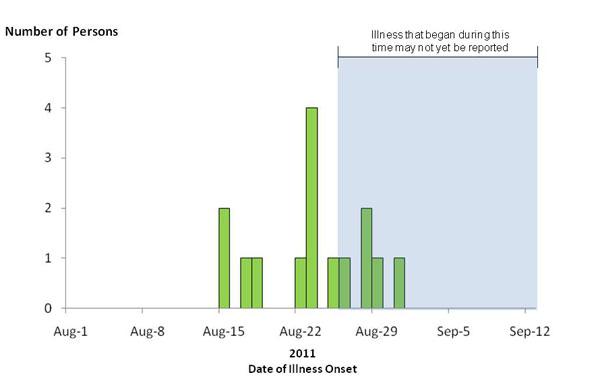Sep 13, 2011 (CIDRAP News) – The US Centers for Disease Control and Prevention (CDC) said yesterday that it is collaborating on the investigation of a multistate Listeria monocytogenes outbreak, warning at-risk groups to avoid eating cantaloupe from Colorado's Rocky Ford region.
So far the outbreak has sickened 15 people, 1 fatally, in four states: Colorado (11 cases), Nebraska (1), Oklahoma (1), and Texas (2). However, the CDC said cases in other states are under investigation to determine if they are connected.
New Mexico health officials said yesterday they have identified nine Listeria cases, including three deaths, and that investigations suggest a link to eating cantaloupe. All nine of the patients had consumed cantaloupe, the New Mexico Department of Health (NMDH) said in a press release, adding that the state's cases are awaiting molecular fingerprinting at the CDC to see if they match the outbreak strain.
Trace-back investigations suggest the cantaloupes suspected as the source of the outbreak are from southeastern Colorado's Rocky Ford region, which are harvested in August and September and distributed widely to grocery stores, the CDC said. Also, lab testing by the Colorado Department of Public Health and Environment (CDPHE) has detected bacteria on cantaloupe collected from grocery stores and from a sick patient's home.
Dr Chris Urbina, chief medical officer and executive director of the CDPHE, said in a statement yesterday that he expects test results later this week that may help pinpoint the specific source of the outbreak.
So far no cantaloupe recalls have been issued. The NMDH said its field investigators are visiting distributors around the state to collect samples for further analysis.
People at risk for severe complications from Listeria infection include older people, those with underlying medical conditions, and pregnant women, the CDC said. Many of the people sickened in the outbreak so far are in the high-risk groups. Among patients with available information, the illnesses began after Aug 15. Most of the sick people are older than 60 and have health conditions that compromise the immune system, it said.
Most (73%) of the patients are women, and all 15 patients were hospitalized.
The NMDH said that all nine of its listeriosis case-patients were hospitalized. The ages of the sick patients ranged from 43 to 96 years, including five women and four men. The patients who died were a 93-year-old man, a 61-year-old woman, and a 63-year-old man.
Though Listeria outbreaks are typically linked to products such as deli meats, hot dogs, and Mexican-style soft cheese made with unpasteurized milk, produce has been linked to US outbreaks before, including a 2009 outbreak in sprouts and a 2010 an outbreak in celery.
The CDC said it receives reports of about 800 Listeria case reports, along with reports of three or four Listeria-related foodborne illness outbreaks, each year.
Listeria infections often cause diarrhea and other gastrointestinal symptoms that are followed by fever and muscle aches, the CDC said. Other symptoms can include headache, stiff neck, confusion, loss of balance, and convulsions. Infections during pregnancy can lead to miscarriage, stillbirth, preterm delivery, and infections in newborns.
People who have cantaloupes marketed as coming from Colorado's Rocky Ford Region in their homes should place them in a closed plastic bag and dispose of them in a sealed trash can. It advised people at risk for listeriosis complications to follow precautions such as heating deli meat and hot dogs until they are "steaming hot" before serving.
The CDC's melon safety steps for consumers includes hand washing before and after handling whole melons, washing and drying them before cutting, and promptly consuming or storing fresh-cut melon at 40ºF or colder.
See also:
Sep 12 NMDH press release
Sep 12 CDPHE press release


















